Cycling Scotland: A brief history of our programmes and key everyday cycling developments
2003
- Cycling Scotland was established in October 2003 as an independent charity to co-ordinate and support the development of cycling in Scotland.
2004
- In April 2004, Cycling Scotland began the process of assessing cycling policy and practice in each Local Authority in Scotland, to establish a baseline and to collect better information on cycling for policy and planning purposes – published in a report the following year.
- In 2004, the charity took over management of the Pedal for Scotland annual event, with thousands of people cycling between Glasgow and Edinburgh each year, until the final event in 2019. Hundreds of thousands of pounds were raised for charity over these years, most notably our longstanding charity partner, the STV Children’s Appeal.
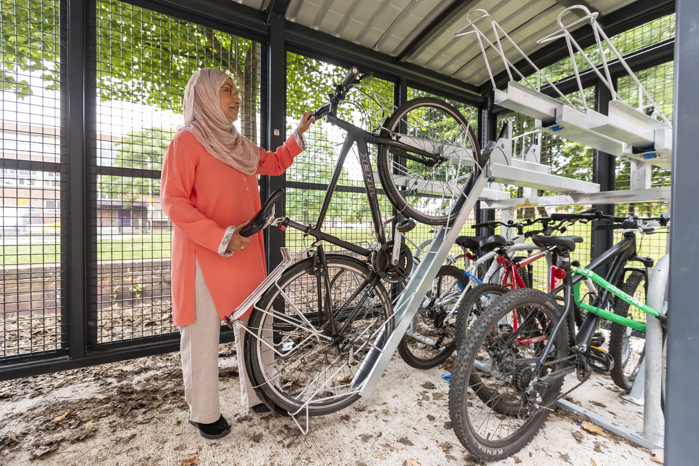
2005
- 2005 saw the launch of the Cycling Friendly Employer Award, to encourage and support the development of destination facilities for cycling at workplaces across Scotland. This was subsequently expanded into the Cycling Friendly Awards programme, which has been central to our work for over twenty years, with the launch of the Cycling Friendly School Award in 2007 to support the provision of facilities for children to cycle to school. This was followed by the introduction of the Cycling Friendly Community Award in 2014 and Cycling Friendly Campus Award in 2015.
- In 2005, Cycling Scotland also introduced Making Cycling Mainstream (MCM) courses, to give guidance on a range of topics, including planning and designing cycling infrastructure, carrying out cycle audits and stakeholder engagement.
- The first Cycling Scotland Annual Conference was hosted in 2005, bringing together the public, private and third sector to focus on the progress on everyday cycling.
2008
- In 2008, Cycling Scotland published its second review of cycling policy and practice at local authorities across Scotland, which identified the need for a national action plan, contributing to the development of the Cycling Action Plan for Scotland.
2010
- In 2010, Cycling Scotland took over the administration of cycle training in Scotland, and introduced the three level Bikeability Scotland programme in schools, in line with the National Standard for cycle training. Since its introduction in academic year 2010-2011, the rates of cycle training in schools in Scotland have more than doubled.
- The first ever Cycling Action Plan for Scotland (CAPS) was launched by the Scottish Government in June 2010, with later updates published in 2013 and 2017, informed by a CAPS Progress Report consulted on and written by Cycling Scotland.
- A Cycling Delivery Forum was launched in 2010, bringing together representatives of all local authorities and Regional Transport Partnerships.
- The Scottish Parliament‘s Transport Infrastructure and Climate Change (TICC) Committee’s Inquiry into Active Travel was published in April 2010, recommending increased funding for active travel.
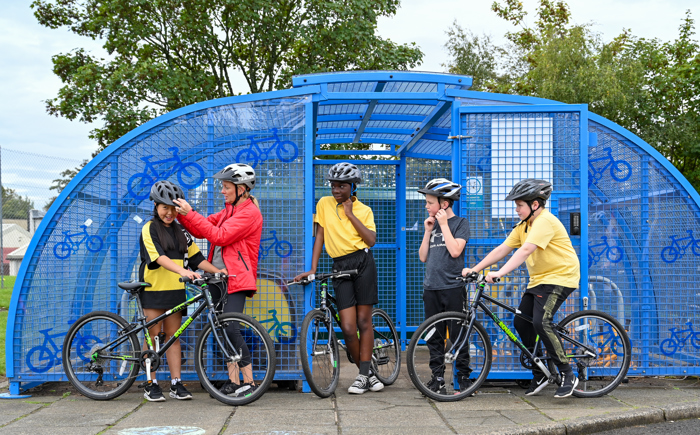
2011
- The national Give Me Cycle Space campaign launched in 2011, to get car drivers to be more aware of children cycling, and to give them more space on the roads The campaign ran on radio, outdoor posters, bus and print advertising. This campaign ran for 14 years, significantly evolving and expanding as the Give Cycle Space campaign to include every person who cycles and working in partnership with Police Scotland.
2012
- The first Pedal on Parliament – a volunteer-led campaign pushing for better, safer and more inclusive cycling conditions – saw thousands of people riding in Edinburgh to the Scottish Parliament.
2013
- In 2013, Cycling Scotland published its third and final assessment of cycling policy and practice at local authorities across Scotland.
- A Cycling Delivery Forum sub-group on monitoring began in 2013, with the first Annual Cycling Monitoring Report published the following year, tracking and reporting on key information on everyday cycling in Scotland.
2014
- Play on Pedals, a partnership project which gets children to learn to cycle in nursery was launched in 2014. Road User Awareness Training (RUAT) was introduced this same year, targeting professional drivers of HGVs and buses. In subsequent years, this driver training has been embedded by various organisations, including Lothian Buses in 2018.
- Cycling Scotland worked in partnership with Sustrans and Transport Scotland to deliver the Legacy Cycle Parking Scheme, as part of the Legacy Active Travel Programme following the 2014 Commonwealth Games in Glasgow, delivering 83 cycle racks including commemorative gold, silver and bronze racks celebrating individual achievements.
2015
- The Bikeability Scotland Quality Assurance Strategy was introduced in 2015.
- The International Comparator Study, commissioned by Cycling Scotland, recommended investment in protected cycle lanes, based on how the Netherlands, Denmark, Germany, Spain and Austria had.
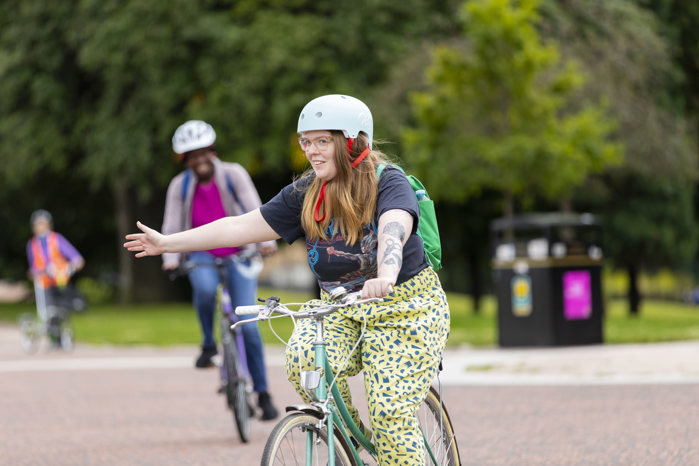
2016
- A comprehensive Adult Cycle Training programme was launched in 2016, aligned to the UK National Standard for Cycle Training.
2017
- In 2017, Police Scotland launched Operation Close Pass, tackling dangerous overtaking behaviour, supported by Cycling Scotland. This same year, the National Monitoring Framework was developed, recording and publishing data with local authorities on everyday cycling.
- The first Attitudes and Behaviours Towards Cycling survey was published - Scottish population-wide, longitudinal research, which ran until 2023. The data helped to understand perceptions of and barriers to cycling, and changes over time, to inform our work and the work of others.
- The partnership Cycling Champion of the Year awards was established, recognising the efforts of individuals to get more people cycling.
- The impact of Bikeability Scotland was recognised in October 2017, with the Scottish Parliament called for every schoolchild to have the opportunity to benefit from cycle training.
2018
- Investment in active travel is doubled by the Scottish Government, leading to the creation of new cycling infrastructure across Scotland, especially in Glasgow and Edinburgh.
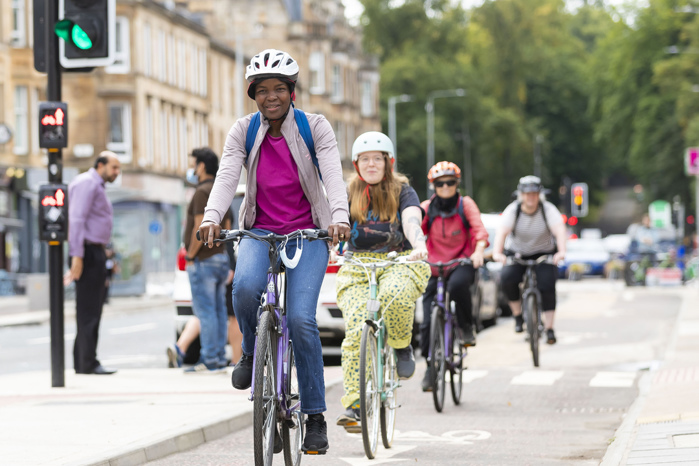
2019
- The social housing partnership fund for cycling and walking facilities, launched in spring 2019, was a new focus, improving cycle storage at housing association and other registered social landlord properties.
- In 2019, the Give Me Cycle Space campaign was updated into the Give Cycle Space road safety awareness campaign, based on research with drivers and in partnership with Police Scotland.
The last Glasgow to Edinburgh Pedal for Scotland ride took place, with 7,000 people getting on their bikes. We announced a change to support shorter, inclusive and free events across Scotland, to extend the benefits into more communities and help increase the use of newly emerging cycling infrastructure.
2020
- An Active Travel Framework was published by the Scottish Government in 2020.
- The NHS Worker Fund launched in response to the pandemic, with health boards awarded £100,000 to provide access to bikes and accessories for key workers.
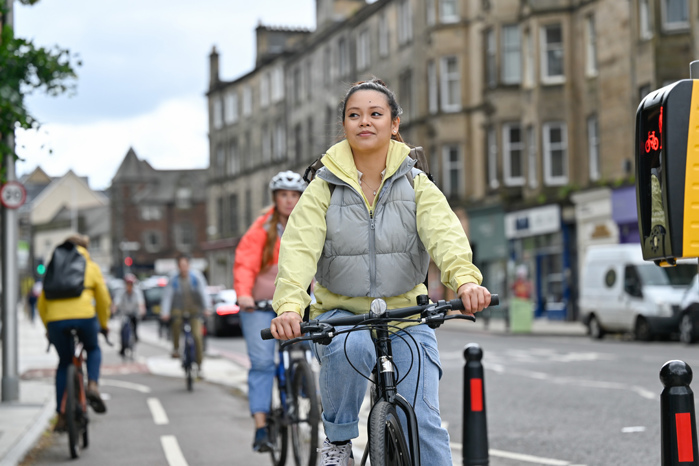
2022-24
- In 2022-24, a residential cycle storage fund helped local authorities install on-street cycle storage to improve access to safe, accessible cycle storage in residential areas, such as tenements.
- Over 2022-23, there were 480 parking and storage installations funded across Scotland, with 700 funded in 2023-24.
- In 2022, an access to bikes for young people fund was launched with new support for local authorities to provide bike re-use from 2022.
- In 2022, the Scottish Government published the Cycling Framework for Active Travel.
- A successful bike reuse pilot in 2023 with Fife Council recovered 404 bikes, with 240 distributed to new owners and 229 used for parts, creating a template for similar initiatives across Scotland.
Key policy documents
Links to key documents related to active travel and transport policy in Scotland, including national strategies and guidance.
- Cycling Framework for Active Travel: A plan for everyday cycling
- Active Travel Framework
- Scotland’s National Transport Strategy 2 (NTS2)
- Strategic Transport Projects Review 2 (STPR2)
- Scotland's Climate Change Plan (CCP)
- The Place Based Investment Programme and Framework
- National Planning Framework 4 (NPF4)
- Scotland’s Road Safety Framework to 2030
- Active Scotland Delivery Plan
- Cycling by Design (2021 update)
- 2016 CAPS Progress ReportSize: 1 MB
- 2015 International Comparator StudySize: 2 MB